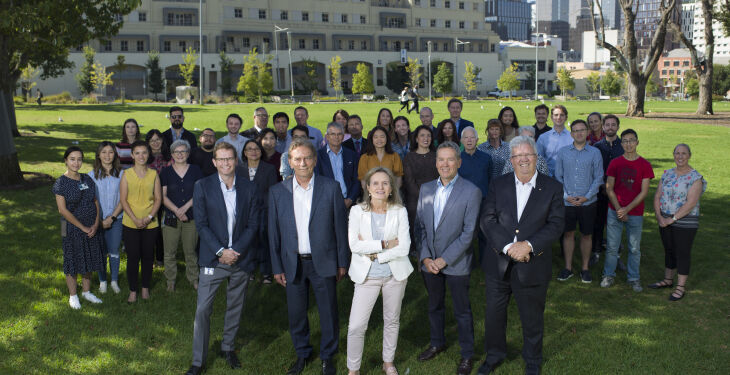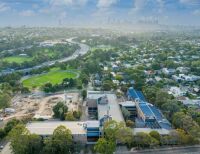 Collaborators from the Doherty Institute and Monash Institute of Pharmaceutical Sciences. Image: Monash Institute of Pharmaceutical Sciences
Collaborators from the Doherty Institute and Monash Institute of Pharmaceutical Sciences. Image: Monash Institute of Pharmaceutical Sciences
Melbourne researchers are calling on healthy people aged 18-70 living in Victoria to roll up their sleeves for a Phase 1 clinical trial of two Melbourne-made COVID-19 vaccines.
The two vaccine candidates, created by researchers at the Peter Doherty Institute for Infection and Immunity (Doherty Institute) and Monash Institute of Pharmaceutical Sciences (MIPS), are distinct from existing vaccines that are in use around the globe because they focus the immune response on the tip of the SARS-CoV-2 spike protein, called the receptor binding domain (RBD).
The RBD enables the virus to enter and infect cells in the body and elicits over 90 per cent of neutralising antibodies (antibodies that can block the virus) following SARS-CoV-2 infection.
The two candidates are:
- RBD protein vaccine – it uses part of the virus protein, rather than genetic material or another virus, to elicit an immune response.
- RBD mRNA vaccine – represents the virus genetic sequence that codes for the tip of the spike, which will lead to production of the RBD protein.
In addition, they are ‘proof-of-principle’ variant vaccines that present the Beta variant to the immune system, which was of the greatest concern when these vaccines were designed. Furthermore, the Beta variant has two of the same key RBD mutations as the Omicron variants (BA.1 and BA.2), so they may also improve immunity to Omicron.
University of Melbourne Professor Terry Nolan, Head of the Vaccine and Immunisation Research Group at the Doherty Institute, which will lead the Phase 1, first-in-human trial, said 114 volunteers would be recruited to participate.
“This trial will assess the safety and efficacy of a single dose of these vaccines as a fourth dose of a COVID-19 vaccine, therefore participants must have had their third dose at least three months prior to the study commencing,” Professor Nolan said.
“People who have been infected with COVID-19 are also eligible, provided they had their infection at least three months prior, and have had their third vaccine dose.
“What’s also unique about this gold standard, randomised, double-blind, placebo-controlled trial is that it will be the first time a side-by-side comparison will be undertaken of two new COVID-19 vaccine platforms.”
University of Melbourne Dr Georgia Deliyannis, who performed most of the RBD protein vaccine experiments at the Doherty Institute, said in pre-clinical trials, the vaccine induced high levels of RBD-specific antibodies, including high neutralising antibodies, following two doses.
“Immunity induced by the RBD protein vaccine protects against virus challenge in a mouse model of SARS-CoV-2 infection, even 100 days following the boost,” Dr Deliyannis said.
“As well as inducing strong neutralising antibody immunity to the Beta variant in mice, it also retains its potential to neutralise the original ancestral strain, and preliminary in-lab studies have demonstrated neutralising activity against other variants including Delta and Omicron.”
Professor Colin Pouton of MIPS, who led the development of the RBD mRNA vaccine, said the team used similar strategies to formulate and manufacture the vaccine to those used by other global biotech manufacturers, but designed the mRNA to focus on the RBD, in alignment with the RBD protein vaccine.
"In common with the RBD protein vaccine, the RBD mRNA vaccine induced high levels of RBD-specific antibodies and protected against virus challenge in the mouse model. We have good reason to think that both vaccines will perform well in the clinic," Professor Pouton said.
Professor Sharon Lewin, Director of the Doherty Institute, said with millions more doses of COVID-19 vaccines still to be administered globally, the need for additional vaccines remains, and with new variants arising, next generation vaccines with innovative technology are required.
“Both vaccines are efficient to produce and can be rapidly modified to incorporate distinct or multiple RBD mutations arising in future variants,” Professor Lewin said.
“In addition, Australia needs the ability to manufacture its own vaccines to ensure our own supply should future global shortages occur, and to contribute to the global need for COVID-19 vaccines.”
Monash University Professor Chris Porter, Director of MIPS, said that working collaboratively with Australian and Victorian governments, the Doherty Institute and industry partners is a true testament to Victoria’s commitment to the exploration of mRNA therapeutics.
“We are working together to build an RNA ecosystem and this trial provides a first class example of what we hope will be a template for Australian industry and academia to work together to progress this enormously promising new field of medicine.”
People interested in participating in the clinical trial are encouraged to visit Doherty.edu.au to find out more, email [email protected] or call 8344 9325.
Funding comes from Medical Research Future Fund, mRNA Victoria, Jack Ma Foundation, IFM Investors, Australian Research Council and National Health and Medical Research Council.
















